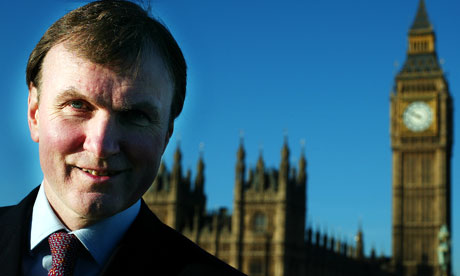Business chiefs who backed coalition cuts raise fears for UK economy
Entrepreneurs and executives who supported chancellor's aggressive measures now concerned about weak growth

Archie Norman, the former Conservative MP for Tunbridge Wells who now chairs ITV. Photograph: David Sillitoe for the Guardian
Some of the UK's most prominent business leaders, including individuals who gave their personal stamp of approval to the chancellor's aggressive spending cuts, have said they have growing concerns about the state of the economy, warning of weak growth and rising inflation ahead.
Archie Norman, the former Tory MP who now chairs ITV, said the government's growth targets were too optimistic. The former Asda boss Andy Bond, Carphone Warehouse founder Charles Dunstone, Tory peer Lord Wolfson, who runs Next, and Yell chairman Bob Wigley predicted tough times ahead as soaring inflation dents consumer spending power, although they continue to support George Osborne's austerity strategy.
Bond expressed doubt about the ability of the private sector to create as many jobs as hoped. "I don't think the private sector is going to be able to pick up the slack in this climate," he said.
Bond, who ran the UK's second largest supermarket chain for five years, forecast a two-year "retail recession" earlier this week.
He was one of 35 bosses who signed a letter to the Daily Telegraph six months ago supporting George Osborne's plan to slash the deficit and arguing that businesses "should be more than capable of generating additional jobs to replace those lost in the public sector".
Luke Johnson, the entrepreneur and former owner of Pizza Express, said the government should "stick to its guns" but added: "I admit the recovery is weak, but we have to stay the course. If we waver, living standards would deteriorate even further."
Their comments come at the end of a week in which major high street names including Halfords, Mothercare and HMV said sales had slumped and the off-licence chain Oddbins toppled into administration. The fragility of the recovery is spelled out by the number of public companies warning of falling profits, which hit a two-year high in the first three months of the year.
The new tax year on Wednesday triggered sweeping changes to the tax and benefits system that leave the average household about £200 worse off. The measures kicked in as figures confirmed that take-home pay fell for the first time in three decades in 2010 because prices climbed faster than incomes.
The Office for National Statistics measured a 0.8% decline and predicted that would worsen to 2.0% this year.
With retailers' costs rising sharply, at a time when anxious shoppers are tightening their belts, they are on the front line of the battle over whether the government's policies have pulled the economy back from the brink, or driven it towards a fresh disaster.
Rocketing global oil prices caused by the unrest in the Middle East, and record cotton prices, are adding to price pressures that have sent inflation to 4.4%, more than double the Bank of England's target.
Wolfson, a government adviser who also signed the Telegraph letter, said it was "not a question of being pro-cuts" but "recognising the alternative is even worse for business".
He said inflation was the biggest problem: "We believe inflation is exerting a greater burden on our customers' finances than government cuts or lack of credit."
The toxic cocktail means prices – also fuelled by higher VAT – are rising across the high street. Next has pushed its prices up by 8% while at Marks & Spencer the average is 6%. To keep a lid on inflation, M&S is looking to shift some of its manufacturing out of China to central Asia where manufacturing costs are lower.
Norman said he had little sympathy for what he called "special pleading" by some retailers as he agreed with Wolfson that the main worry was inflation, rather than cuts.
He added: "A lot of people like me are worried that government projections for growth are too optimistic."
Dunstone said: "It's going to be tough for the retail sector but burying your head in the sand and hoping things get better never works. We have to take responsibility for our destiny."
Wigley said the chancellor had introduced business-friendly measures but life for small firms was "difficult".
No comments:
Post a Comment